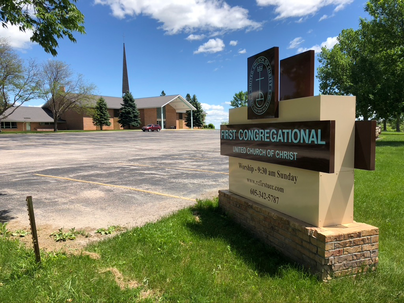 Photo: M. Lee Photo: M. Lee I have been cleaning out my office and finding many things that spark memories. Old class notes, meeting agendas, lists of volunteers (some of whom have gone on to their reward), computer cables, prayer beads and blessing stones – all the sundry of ministry with you. Some memories led to a giggle, and some to a tear, but all reminded me how much you have helped me grow and mature as a minister and as a Christian over our years together. So I say again, thank you. So much of my thoughts and heart about leaving, and my deep thanks to you for walking with me for many years, are in my sermon from June 7th. I know that the AV gremlins were wreaking revenge on me for the times I forced them into submission for a forum or class. I imagine them plotting before church, “I’ll get you my little pretty, and your little dog too!” I am sorry for the frustration many of you experienced with the Facebook feed, and that Hal and Dean experienced trying to make it all work. They did the best they could, and in the end our brilliant AV team had a backup, and there is a clean copy of the audio (as well as a printed manuscript) here. I encourage you to read or listen to that, for it covers many things I would otherwise have tried to say in this my last Staff Reflection. I can now tell you where I’m going and what I’ll be doing there. I will be at First Congregational Church of Rapid City, South Dakota. It is an old historical church, founded during the gold rush as the first Christian church in Rapid City. A medium-sized congregation, they were about 125 in worship prior to the pandemic, and are now doing worship on Facebook Live. The current building was built in 1960 in a modified A-frame style common to many UCC’s of that era (including Plymouth), with a large fellowship hall and an education wing with numerous classrooms. Once considered a fair distance from downtown backing up to the ridge of Dinosaur Park, it is now quite surrounded by the city. They have an enormous 60’ tall white cross that can be seen from the freeway into downtown. The sanctuary has a beautiful pipe organ in the back balcony choir loft, and they employ part time a talented organist, music director and office staff. I am following an ordained husband and wife team who served as pastor and education director, who have been there for 25 years. They gave the church notice of their retirement a year ago, and the church has honored and celebrated their service well. I met them briefly last week and we chatted about their plans to visit children on the west coast and then relocate away from Rapid City. Talented and nice people, whose ministry will be missed. That is the context my interim ministry for the next two years. They will need some time to mourn, remember, and evaluate their past. Then they will work together to discern their vision and mission for their community. In interim work, we use three key questions: Who are we? Who is our neighbor? What is God now calling us to do? My job is to guide them through this transitional time. (There are different types of interim ministry, and for this sort the term “interim” is falling out of use in favor of the term “transitional ministry”). In this time of Covid, we’ll reevaluate how online worship is and can be improved; with the loss of the education director, we’ll be looking closely at their needs for children and youth formation and explore hiring someone new; they want to explore an ONA process (and are taking a leap and risk in calling me); they are involved in many justice ministries in the community like food banks and homeless shelters; and continue to build their longstanding relationships with the Native American communities both in town and on the reservations. One fascinating ministry they have is the “Woodchucks”: a group of people who split firewood all spring and summer for people whose primary or backup heating is by wood. They deliver the wood to churches on the reservations who then distribute it to people with need. When I was there last week, a half dozen people were working like beavers, adding to the several cords already stacked. Oh, and I will need to keep all the current wheels moving! Worship and education and justice making and pastoral care and weddings and funerals. One of the things that makes me most nervous is getting back in the flow of preaching Every Single Week (which I did for some 15 years prior to my ministry with you), but let’s just say I’m rusty, so pray for that. I’ll be negotiating a different cultural and very red political context; the church sees itself as “moderate” for their community where the GOP out-registers the Democrats by 2:1. A state both where the governor refused to issue any stay-at-home recommendations, and a community where there have been several Black Lives Matter marches (to considerable, but thankfully peaceful, controversy). As some of you have said to me, “May you live in interesting times.” Interesting times indeed, but with a God who knows what “interesting times” are about. So I am excited. I am nervous. Sometimes I am downright terrified – God is calling me to do what? But I go into this with your many kind, encouraging and beautiful words buttressing my soul. Some of you have revived the lost art of card writing, some have sent emails and Facebook messages, and many of you have spoken to me in our Zoom party last week, by phone, or even a few in physically distanced personal encounters. It has been heartening and humbling. So thank you, from the bottom of my heart, for walking with me. I love you. And more important: God loves you --- Go live accordingly. Peace, Rev. Dr. Mark Lee AuthorMark served from 2009-2020 as our Director of Christian Formation for Adults. He is now Interim Pastor elect for First Congregational Church of Rapid City, South Dakota. His life-partner Ivan Loy will continue to live and work the ranch north of Fort Collins, and Mark will come to visit on a regular basis especially during goat birthing season. He will also continue to have adventures in lgbtq advocacy, overseas pilgrimage, and learning to fly fish. You may reach Mark with non-church or ministry related news via his personal email revmarkblee at gmail dot com. Write something about yourself. No need to be fancy, just an overview. 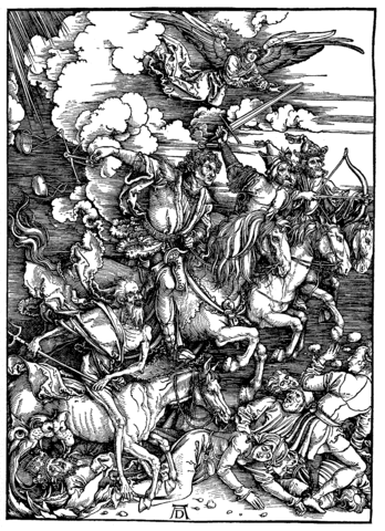 By Albrecht Dürer - Unknown source, Public Domain, https://commons.wikimedia.org/w/index.php?curid=5158869 By Albrecht Dürer - Unknown source, Public Domain, https://commons.wikimedia.org/w/index.php?curid=5158869 by the Rev. Dr. Mark Lee Over these last two weeks, I’ve read many people say that this current situation is “apocalyptic.” This is one of those theological terms that has captured the popular imagination. I think people are right to use it, though not in quite the way they think. Usually something is referred to as apocalyptic when there is extraordinary disaster or catastrophe. The first definition offered on Google is, “1. the complete final destruction of the world, as described in the biblical book of Revelation and 2. an event involving destruction or damage on an awesome or catastrophic scale." The older name for the last book of the Bible we usually call the Book of Revelation is “The Apocalypse.” Images of pestilence, ecological catastrophe, drought, earthquakes, floods, loosed demons, war in heaven and on earth, and finally, the complete end of the present age and the world it inhabits fill much of the book. For the apostle John who saw these visions, and for the community to whom he was writing, this was not an exercise in disaster porn. It wasn’t even the schadenfreude of seeing their oppressors judged and destroyed by God. Cinematic horror films terribly miss the point. It was a deep encouragement that despite their persecution unto martyrdom, God has not forgotten them, remembers their suffering and faithfulness, and will rescue and reward them in the End. That is the point of the book of Revelation; that is what is being revealed in this book. Which is the core meaning of “apocalyptic”: revealing, unveiling, showing forth, exposing the reality of things. In the vision John saw, God lifted the veil off the everyday news of the tribulations his community was enduring and showed them the deep truth of God’s work in the universe on their behalf. It is this meaning that is more helpful as we consider our own situation to be “apocalyptic.” What has this virus revealed? What has been exposed? Some may be things we already knew, but stand in sharper view, others may be things that have been hidden but are now clear. So we now see that our country’s medical system has enormous gaps in its organization, financing, and delivery. We see people’s resistance to change until a situation affects them directly. We see that focusing solely on profit to the exclusion of other stakeholders warps the actions of corporations. This crisis lays bare longstanding fissures of race and class we usually prefer to ignore but now cannot. We see the bankruptcy of ideologies that divide us from the rest of the world and from one another. We see how government can mobilize vast resources which no individual church, community or company can mobilize alone. We see the practical results of wise management versus corrupt management of those resources, seeing which lives are valued and which are lost. This apocalypse reveals things about our society we must deal with. You cannot unsee these things. This also reveals things at a more personal level. Being yanked out of my normal routines and connections, I have had to face my own fears. Every scratchy throat or cough, and I wonder, “Is this IT?” Will the economy collapse so severely and for so long that my paycheck and my husband’s pension dry up? What about my 87-year-old father, what if he gets it and I can’t help? What if this lasts so long that we really, truly, completely run out of … toilet paper!? Will I have to install one of those nifty hand spray bidets that were everywhere in the Middle East? And learn to use it without spraying it all over everything in every direction? What if I get sick when the hospital is overwhelmed, and because of my age and medical history don’t make the triage cut? And what about…. I’ve been having weirder dreams than usual, and even some nightmares, subconscious alarm bells sounding. I remind myself that we have not landed in a “Mad Max” movie. And then there is the anger. I don’t do anger well, so like to keep it well quashed (which my therapist keeps saying isn’t the right approach). I watch the news and see certain politician’s policies, and my blood boils. Yelling at the TV is only so satisfying. So I get snarky with my husband and grouchy with the animals. Or I go on Facebook, and see the same stories magnified time upon time. In a fit of pique, I write a massive screed, to REALLY tell off the Stupid Person who reposted the Dumb Thing. My anger combines with others who also have time hanging heavy on their hands, and normally placid chat rooms and email lists become hotbeds of misunderstanding, intrigue and drama. Better to channel my anger at this whole situation into constructive work, efforts that are pro-active instead of reactive, telling the world what I do believe rather than why someone else is wrong. Because the anger unmanaged makes my obviously correct and righteous views toxic to me -- and doesn’t convince whoever I’m writing at anyway. I would do far better to close the laptop and go work in the garden. Or cook. Or read a book. Or play with the dog. Or nap. Or what about praying! Thank God that fear and anger are not all that is being revealed. I see creativity, care and compassion as well. Our situation has revealed an amazing outpouring of creativity. I’ve seen colleagues who never imagined live-streaming church come up with a huge variety of ways to keep people connected with God and one another. Some, like Plymouth, livestream their services, with either a skeleton crew at the building or with different people contributing parts of the service from their homes. Some have assembled prepared clips of musicians, preachers, readings and edit them together. I’ve seen an explosion of online devotionals, musical offerings, children’s stories, and even fellowship time. I’ve seen poems online from people I had no idea wrote poetry, and strings of uncaptioned beautiful landscape photos “so we can still travel in our hearts.” The best thing I’ve seen? A hilarious “blooper reel” of worship outtakes by some clergy friends, which let me know that their polished presentation (of which I was vaguely jealous) was definitely not the first cut! This virus has revealed deep wells of caring and sharing. I’ve had friends who I’ve not seen in many years set up online Virtual Coffee with me. Nearly every phone call, email or text includes people asking, “Do you need anything? I can shop for you, since you can’t go out.” People have contacted the church with the same offer, to be “Gofers” for those who are isolated. Others have offered funds to cover for those in a bind. Medical masks have been pulled from back cupboards and donated to hospitals. Folk let others into the checkout line ahead of them, smile at the clerks, and give them compliments for holding up amid the rush of extra work. Owners of small businesses are finding ways to keep employees on their health insurance even while furloughed. Many 12-Step groups are connecting online, providing live-saving support for people who might otherwise relapse – and helping those who do relapse to start living One Day At A Time once again. The stories of care are unlimited. Look for them. This is an apocalypse worth paying attention to. Where it reveals things in society or our own psyche that need healing and change, we have Sabbath time and space to do so. Where it unveils the wells of love and compassion that already there, we can nurture those virtues. John’s Apocalypse does not end with fire and brimstone, but with the ever-loving presence of God: And I heard a loud voice from the throne saying, “See, the home of God is among mortals. He will dwell with them; they will be his peoples, and God himself will be with them; he will wipe every tear from their eyes. Death will be no more; mourning and crying and pain will be no more, for the first things have passed away.” And the one who was seated on the throne said, “See, I am making all things new.” …Then he said to me, “It is done! I am the Alpha and the Omega, the beginning and the end. To the thirsty I will give water as a gift from the spring of the water of life. Those who conquer will inherit these things, and I will be their God and they will be my children.” (Revelation 21:3-7) I pray that promise is among the things this apocalypse is revealing to you. Or as a beloved mentor would tell me, “Fear not! This too shall pass.” Peace, Mark PS: If you, like me, have a compromised immune system, or the calendar says you are “older” despite what you tell yourself, we have volunteers who are willing to do shopping or other simple errands for you. Also, if you need financial help, we have members who are willing to help out by donating through our church assistance funds. Contact one of the ministers (Hal, Carla, Jane Anne) and they will work to connect you. AuthorMark recently celebrated his tenth anniversary as Plymouth’s Director of Christian Formation for Adults. He also serves as chair of the Platte Valley Association's Committee on Ministry. 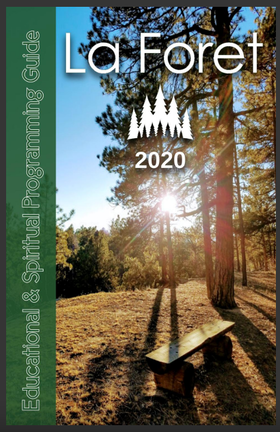 Click to view the online catalog Click to view the online catalog Spiritual growth doesn’t just happen in the splendid isolation of our prayer closets (whatever that might be!). Even for us introverts, spiritual growth is often jump-started in relationship with others. This is one reason that from the very beginning the church has set aside time and space for people to connect with God via their fellow believers. Few of us are called to join a monastic community in the desert or mountain or downtown. We have been called to an active life – jobs and families and congregational activities and community events and sports and justice-making and service. But the more our lives are active, the more we need to nurture the spiritual foundations of that life: prayer, study, meditation, silence, caring conversation, finding ways to connect with God who is fount and source of the power that keeps us going. This is where short term retreats, studies, and conferences can nourish us. We gain wisdom, knowledge and strength from the programs and those who are our sisters and brothers even if but for a weekend, who join us in the experience. A single coal pulled out of a campfire swiftly runs cold, but when placed among the other coals they together make a fire to light and warm all those around. Our Rocky Mountain Conference of the UCC is particularly blessed to have a wealth of opportunities easily accessible: our beautiful camp/conference center at LaForet in the Black Forest north of Colorado Springs. As generations of our youth will tell you, their summer youth camps, family camp, “Grandparents and Me” camp, and MADD [Music, Arts, Dance & Drama] Camp have been integral parts of their spiritual journey year after year. This year they are even planning a “Rainbow” camp for LGBTQQA+ youth! More recently, LaForet has expanded to include more adult programs (and updated facilities more comfortable for those who aren’t into leaping into an upper bunk). This year, they are offering programs on racism and white fragility, communicating across the divides in our political discourse, the “School of Celtic Consciousness” with Philip Newell, Contemplative Camp, and different OWL (human sexuality) leaders trainings. You can find all these and more information in their awesome new online brochure. Be sure to thank their program director the Rev. Logan Bennett and their Executive Director (Plymouth member) Larry McCulloch for organizing such a wonderful place and programs! Peace, Rev. Dr. Mark Lee Director of Christian Formation (Adults) AuthorMark recently celebrated his tenth anniversary as Plymouth’s Director of Christian Formation for Adults. He also serves as chair of the Platte Valley Associations’ Committee on Ministry. By the Rev. Dr. Mark Lee The prophetic tasks of the church are to tell the truth in a society that lives in illusion, grieve in a society that practices denial, and express hope in a society that lives in despair. – Walter Brueggemann (Reality, Grief, Hope: Three Urgent Prophetic Tasks, Eerdmans 2014.)  Plymouth has been ONA for a generation. Young people have grown up in our church who have never known other than an ONA faith community. Every Sunday’s welcome announces that we are an “Open and Affirming church of the United Church of Christ.” Our ONA statement says that “ all persons are created by God and are equal in worth and dignity. We recognize, celebrate and give thanks for the many diverse gifts of God among us…. [We are] welcoming into full membership and participation in the Body of Christ persons of every race, language, age, gender, sexual orientation, gender identity, ethnic origin, physical and mental ability, economic status and nationality.” Plymouth hired LGBT clergy and staff even before becoming ONA, putting our money where our mouth is. We regularly staff informational booths at Fort Collins Pride, are longtime hosts of PFLAG, celebrate gay and lesbian marriages, have a private all-gender and handicapped accessible restroom, and integrate queer people into the mainstream of church life. As occasion demands, we speak out for justice for sexual minorities. For the most part, we are quite comfortable proclaiming ourselves ONA – though occasional vandalism of the rainbow flag on our street sign reminds us that not everyone shares our openness. We fix the sign, unapologetic about the truth. In spite of the deepening and very troubling backlash over the last three years against marriage equality and other advances by GLBTQ+ people, few social issues have seen so much change in so short a time. We know that there are still glaring loose ends concerning protection regarding employment and public accommodations, and backlash is to be expected (given the radial reshaping of the courts, including the SCOTUS, under the current administration, outright reversals are not unlikely). Yet there has been so much progress -- where in but my own lifetime we have gone from police raids on gay bars to politicians campaigning there, from AIDS decimating the community to long term treatments managing the disease and PREP helping prevent it altogether, from growing up in an information vacuum to young people being able to access queer communities with the click of a mouse or step into their high school GSA -- this is a time of hope and joy. When we ask, “We are ONA, so now what?” it means we act vigilantly and courageously against those tides that would undo the progress that has been made. It also means we grieve losses like the reversal of military policies that had accepted transgender troops. ONA calls us to deepen our understanding around the growing edges. We are pretty knowledgeable about gay and lesbian persons and relationships, but less so about bisexual or transgender people. A recent survey of ONA churches said that only 40% “Can offer a confident and well-informed welcome to your transgender neighbors… [or] Have undertaken a study of the transgender experience.” Our own community has been spared the brunt of controversy around so-called “bathroom bills” and other legislation aimed at making transgender person’s lives difficult; Colorado just passed legislation allowing people to more easily modify their birth certificates and other legal documents to reflect reality. While there has been fierce and often ugly debate about transgender people’s lives – even their very existence – those debates have largely passed us by. Yet as an ONA community, we need to be able to respond intelligently when our sisters and brothers are pressured or attacked. We also realize that we have family members and fellow congregants for whom this is no mere academic speculation. For these reasons the upcoming Forum series will be delving deeper into gender identity issues than we have in a very long time. We will be basing our programs on the TransAction curricula published by the UCC Coalition for LGBT Concerns, who shepherd the ONA program in our denomination. See also other resources here. Among the things we hope to address is the fear of being wrong or offensive. The Forum Team has had a variety of discussions trying to figure out vocabulary which we find is fluid and changeable. How has the experience of people changed the ways they describe their gender identity, ranging from transsexual to transgendered to transgender to genderqueer to non-binary to other things altogether? There are trends but no consensus. People’s experiences vary widely. We also seek to understanding our own gender identity even if we are not transgender, not treating ourselves as the default since there are many ways to be man or woman or in between and our own experiences vary widely. So long as one is respectful, and grants someone the right not to answer a question, the only bad question is the unasked one. There is enough grace to cover our gaffes. We embrace an ONA commitment not despite our Christian faith, but because of it. Concerning gender-variant people, we remember that the first non-Jew to accept the Christian faith was an Ethiopian eunuch, who heard the gospel and gladly believed. A person of deep faith commitment, they had traveled to Jerusalem on pilgrimage even though as a eunuch they would not be allowed into the temple. The Spirit led the apostle Phillip to share the good news of Jesus with him. When they came to water and they asked, “What is to prevent me from being baptized?” the clear answer in the new Jesus movement was “Nothing!” Not their nationality, not their race, not their sexuality. The eunuch was baptized and went their way rejoicing (see Acts 8:26-40). This is a clear example of the word from the prophet Isaiah, pushing back against the Deuteronomic bars against eunuchs – and by extension, welcoming other genderqueer people: Don’t let the immigrant who has joined with the Lord say, “The Lord will exclude me from the people.” And don’t let the eunuch say, “I’m just a dry tree.” The Lord says: To the eunuchs who keep my sabbaths, choose what I desire, and remain loyal to my covenant. In my temple and courts, I will give them a monument and a name better than sons and daughters. I will give to them an enduring name that won’t be removed…. My house will be known as a house of prayer for all peoples, says the Lord God, who gathers Israel’s outcasts. I will gather still others to those I have already gathered. (Isaiah 56:3-5, 8 CEB) Plymouth is and is becoming a “house of prayer for all people.” Thank you for making that possible! Peace, The Rev. Dr. Mark Lee AuthorMark recently celebrated his tenth anniversary as Plymouth’s Director of Christian Formation for Adults. He also serves as chair of the Platte Valley Associations’ Committee on Ministry. Rev. Dr. Mark Lee “In philosophy, or religion, or ethics, or politics, two and two might make five, but when one was designing a gun or an aeroplane they had to make four.” ― George Orwell, 1984 “What is truth?” --Pontius Pilate in John 18:38 As the country’s political crisis intensifies, the battle is not only in congressional hearing rooms but on our televisions, news magazines and computer feeds. Amid the blizzard of claims and counter claims, one charge is wielded as a seeming high card: “That’s just fake news!” Conversation stops, there is no deposit of agreed facts to argue from, what’s the point? Does the one who can pay for the loudest ads win? While it is easy to blame one partisan side or another for this development, it is a reflection of trends for which we carry some responsibility. We have sown the wind of skepticism and reaped the whirlwind of a world that rejects the reality of any truth. In justified reaction to religious backgrounds that were dogmatic, very sure that they had the capital-T Truth to the exclusion and persecution of other points of view, we have often come close to denying that there is any truth at all. We see that truth is often an exercise of power, that “The one with the gold makes the rules,” and that religious truth claims are often used as an absolute sanction against women, glbtq+ people, racial and ethnic minorities, and freethinkers. We also know that God is not containable in human words or experience, that God extends beyond our imagination and concepts, and seems to have a keen allergy to being put in a box. So our usual response has been to be extremely tentative about saying anything specific about God. We are more comfortable talking about social ethics, subjective experience, and the things that make for comfortable community. God fades into the background as a vague symbol, the church becomes “a helpful social institution filled with nice people,”, and the main purpose of religion is to feel OK about ourselves and our tribe (Kendra Dean, Almost Christian). Theological knowledge is seen as essentially unknowable, that arguments for or against particular doctrines are hopelessly infected with political bias, and we are better working out our thoughts in the privacy of our own minds. We are not atheists nor agnostics; we pray “To Whom It May Concern” for healing even while we have qualms about the idea of G*d intervening in human affairs. It is safer to focus on social ethics as something external, this-worldly and practical, but there we are even more vulnerable to charges of making our own political opinions into something divine. Do we really aspire to no more than to be “The Democratic party at prayer?” (Which is a gloss on an old saying regarding a sister denomination being “The Republican Party at prayer.” The issue of political tribes driving religious sorting is a topic for another time but is part of the decline of the church as a social institution where people learn live with and love the civic Other.) I suggest that we work at reclaiming the idea of Truth, starting with our willingness to articulate theological truth. While we cannot comprehend all of God, we can know some things truly. Theology can be hard and the church has a unique vocabulary – but the same can be said for calculus, gardening, tax accounting, psychology, auto mechanics, fly-fishing and myriad other disciplines we pursue. While we cannot entirely escape self-interested motivations, the generally shared Christian ethics of love of neighbor, self-sacrificial love, that all persons are made in God’s image, and knowing that we ourselves are not God can go a long way towards taming our lust for political power. We need not have theological certainty, we live our whole lives in spheres of probability and working hypotheses. We dress appropriately for 60% chance of snow, we agree to a medical procedure with an 80% chance of success, and we invest for the future based on our best extrapolations from prior year’s earnings. We fall in love and vow “’Til death do us part,” not knowing the twists, disappointments and tragedies of life to come; we raise children in hope and fear and trust that our best will be good enough and that they will surmount our inevitable mistakes. In the religious sphere, we baptize babies trusting that God will be faithful to the church now as God has for twenty centuries, youth confirm their journey of faith not knowing how much wonder and weirdness lies beyond the circle of knowledge they already have, we walk the labyrinth of discipleship sometimes faithful and sometimes failing, and we lay our saints to rest trusting their soul to a God who is Love. We dig into the Bible and tradition and human experience knowing that smarter, more spiritual, and more dedicated people than we have been blessed and stumped by these same texts; we stand on the shoulders of giants (and sometimes need to kick them in the shins). Start with what you know you know, then push along the edges of that sphere of knowledge. Envision blowing up a balloon; as the sphere increases, there’s more inside which you know. But paradoxically, there is even more surface engaging the rest of the universe – as you know more, you realize that the area you don’t know is even greater! This is what we mean by “living the questions.” The famous Rainer Maria Rilke quote we like so much isn’t an invitation to live forever in the questions, but to see them as part of a larger process. “Have patience with everything unresolved in your heart and to try to love the questions themselves,” he writes. “Don't search for the answers, which could not be given to you now, because you would not be able to live them, And the point is, to live everything. Live the questions now. Perhaps then, someday far in the future, you will gradually, without even noticing it, live your way into the answer” (From Letter 4, Letters to a Young Poet). The questions are a necessary part of the journey, and one that many adults at Plymouth engage with gusto, but they are a tool for living towards working hypotheses, useful probabilities, and a considered faith. “The point is to live everything” not to be agnostic. Faith has not much to do with what we know or not, but how we trust the goodness of God and that we are increasingly aligned with God’s project in this universe. “There was truth and there was untruth, and if you clung to the truth even against the whole world, you were not mad” (George Orwell, 1984). This is how we rehabilitate the idea of Truth – not letting it be hijacked by those who think they have it in all completeness, but also not surrendering it to those who would replace it with the propaganda of the day. We claim the core things we do know and proclaim them loudly in a world that claims might makes right, defiles the image of God in different people, and denies that love is stronger than hate. We repudiate charges of “fake news” that are based on power, but reason from data that is open to discussion and debate. Maybe that will help us deepen our relationship with the One who Pilate didn’t recognize when he scoffed, “What is truth?” -- the One on whose lips the church heard, “I am the Truth.” Peace, Rev. Dr. Mark Lee AuthorMark recently celebrated his tenth anniversary as Plymouth’s Director of Christian Formation for Adults. He also serves as chair of the Platte Valley Associations’ Committee on Ministry.  SalFalko, Flickr. Attribution-NonCommercial 2.0 Generic (CC BY-NC 2.0) SalFalko, Flickr. Attribution-NonCommercial 2.0 Generic (CC BY-NC 2.0) The United Church of Christ blends the advantages of governing systems from the churches that covenanted to form our denomination. The Christian Congregational stream gives us our emphasis on local control and the autonomy of local churches, while the Evangelical & Reformed stream helps us articulate the ways we are connected to one another to accomplish those things no individual congregation can do alone. “Covenant” is not only a foundational theme in the scriptures; it is the way individual believers relate to one another to form churches -- remember the Membership Covenant we shared with new members last Sunday -- and how churches, associations and conferences (“expressions of the church”) provide support to one another. The UCC Constitution describes covenant this way: Within the United Church of Christ, the various expressions of the church relate to each other in a covenantal manner. Each expression of the church has responsibilities and rights in relation to the others, to the end that the whole church will seek God's will and be faithful to God's mission. Decisions are made in consultation and collaboration among the various parts of the structure. As members of the Body of Christ, each expression of the church is called to honor and respect the work and ministry of each other part. Each expression of the church listens, hears, and carefully considers the advice, counsel and requests of others. In this covenant, the various expressions of the United Church of Christ seek to walk together in all God's ways. (Article III) This Saturday is the Annual Meeting of the Platte Valley Association, of which Plymouth is a key partner. Associations are the nearest level of covenant among churches. Our Platte Valley Association encompasses thirteen congregations stretching from Longmont to Casper, from Laramie to Sterling. The Association is the body entrusted with nurturing and vetting potential clergy through the ordination process, discerning everything from school transcripts and internship experiences to psych evaluations and criminal background checks. It is the body called upon when there are allegations of clergy unfitness for ministry, and it helps when invited by churches riven by internal troubles. It pools resources from its member congregations to provide scholarship assistance to seminary students, continuing education grants for clergy, and support for mission trips and outreach. In a denominational system that often produces “Lone Ranger” ministers and congregations, it provides fellowship, trainings, connection, encouragement and support. The Association, like the Conference (our Rocky Mountain Conference covers Colorado, Utah and much of Wyoming), the national General Synod, and the central offices of the denomination, is supported by its local congregations through Our Church’s Wider Mission (“OCWM”). In keeping with congregational traditions of financial freedom, each church determines its OCWM support. Declining membership in many churches has caused a decrease in OCWM support since the work of local, regional and national settings are often less visible and thus easier to cut when local churches have budget crunches. Yet paradoxically, it is often then that congregations need the resources those bodies provide. I was recently talking to a lay leader from a congregation in our Association that had a significant crisis a few years ago. “We still exist because of this Association. If it hadn’t been for their intervention, we would never have made it. Things were going from bad to worse, and we didn’t know what to do. We are forever grateful.” They are still a very small church in a small community. They are also the only Open and Affirming presence, with ministries reaching far beyond their numbers. They provide a continuing UCC testimony there because of the generosity of the larger churches -- like Plymouth! -- that they are in covenant with. By the same token, systems supported by OCWM are indispensable to churches like ours when we search for new staff and ministers, have young people following God’s call to ministry, join with other churches for mission work, and provide resources churches can’t invent on their own. A great example of the Association’s work is the keynote workshop for this year’s meeting, the Rev. Jane Vennard. Many of you are familiar with her from women’s retreats and prayer workshops she has led at Plymouth over the years. You might not be aware that a few years ago, she awakened to issues of racial justice in ways that went beyond traditional liberal thought to acknowledging her privilege as a white person in our society, and she answered a deep call to action. So she will be leading a workshop: RACISM THROUGH THE EYES OF WHITE PRIVILEGE: A SPIRITUAL QUEST White people have commonly thought that issues of racism are about people of color. We often overlook the fact that whiteness is a racial issue because in our culture white is the norm. This morning exploration will address our white privilege, our white fragility and our contribution to white supremacy. Through story telling and reflection we will take the reality of racism from our heads to our hearts. In this way, the study of racism becomes soul work opening new paths into our spiritual lives. The meeting will be 9 a.m.–2 p.m. at First Congregational Church of Longmont, followed by the installation of their Associate Pastor, the Rev. Amelia Dress. All are welcome, not just clergy and delegates; if you would like to attend, RSVP to our registrar, Linda Petit for lunch. (Jane Vennard’s program is 9 – noon, so you may choose to leave prior to lunch, after which we have the business meeting.) We are blessed to be in covenant with such gifted people. Thank you for your generous support of Plymouth’s commitment to OCWM that makes these ministries possible. Peace, Rev. Dr. Mark Lee Mark recently celebrated his tenth anniversary as Plymouth’s Director of Christian Formation for Adults. He also serves as chair of the Platte Valley Associations’ Committee on Ministry. 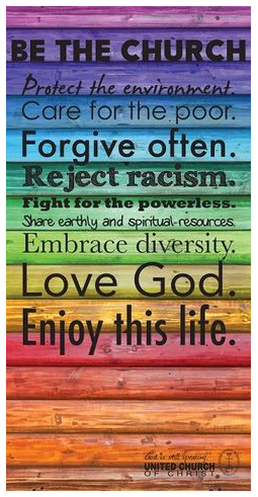 uccresources.com/collections/be-the-church uccresources.com/collections/be-the-church When people come into a progressive church setting one of the most liberating and, for some, unsettling things is the lack of a set creed. Many churches and denominations put their beliefs, often in the form of a creed, right up front. They continue a long tradition within Christianity of identifying “the faith” with “a certain set of orthodox beliefs.” Since the Reformation, we are used to the idea that one group’s “orthodox beliefs” might differ significantly from anther group’s “orthodox beliefs,” but in general the idea that a church is defined by its beliefs has reigned unchallenged. Matters of governance, ethics, relationship with the broader society, liturgy, hymnody and discipline all have generally been regarded as secondary to beliefs. Some people find the lack of a creed as highly freeing, since they are now free (and responsible) to think for themselves. They are liberated from authority figures determining the bounds of their thinking, and can pursue the things they have wondered about. Sometimes they find resolutions, other times one question leads into yet another and another. At times, they then want some guidance to navigate the wide-open spaces, and here is where the challenge begins. The response to “So, what do you believe?” is often quite awkward, because “belief” is not the chief marker or binder of our life together. We generally regard statements like creeds to be “testimonies of faith” rather than “tests of faith.” That is, they are benchmarks showing us what the best thinking and faith work of our ancestors accomplished for their time and place, but are not something we are required to conform to in our time and place. Creeds can be good to know about, since they show what questions vexed our forbears, can alert us to potential dead ends, and provide us helpful tools and categories for our own inquiry. We are often clearer about what we do not believe than what we do believe. So progressives generally disbelieve in “miracles,” which puts traditional doctrines like the Exodus, Virgin Birth or Resurrection into a bin marked “rethink, retool or reject.” We often do not believe in an interventionist God, who “suspends the laws of nature” at times, which puts traditional understandings of prayer into question; we find answers to prayer not in radical results but in renewed relationship with God. We are suspicious of claims of special revelation, whether for the inspiration of the Bible or the authority of church leaders, which raises keen questions of how we discern and value religious authority in self and others. Moreover, the whole discussion of belief in this or that doctrine seems quite beside the point: We are constituted as a community not by believing together but by working together. We have found that we can work to end homelessness without agreeing on whether Jesus turned water into wine or Welch's. We can work to prevent war, and end the ones we are engaged with, without agreeing whether to immerse adults or sprinkle babies for baptism. We can open our doors to the immigrant, stranger and alien “because you were once slaves in Egypt” (Leviticus 19:24, etc.), regardless of whether we regard the sojourn in Egypt and Exodus as historical or metaphorical (or whether we are of Israelite descent). Many times the question is not so much “What do you believe?” as “How do you believe?” What is the motivation for your beliefs? Do you believe this or that doctrine so you can be “right” and someone else “wrong”? Even “liberals” can have “fundamentalist” spirits. Do you believe something so you can draw a bright line between you and the non-believer? And then assume that God will bless you and curse them? But then, “What about the people who I love who are on the wrong side of the church’s bright line?” This is the root cause of so many people who sadly walk away from the church, for they cannot believe that God’s love is so narrow that God refuses to love someone that they are quite able to love. If you scratch at the surface of our working together, you will likely find some common beliefs we do share. We welcome all people because we see no exceptions in “God so loved the world, that God gave the only Son so that everyone who believes in him may not perish but may have eternal life” (John 3:16). We value our fellow human because we are all made in the image and likeness of God and therefore have value like God’s (Gen. 1:26, 9:6, etc.) We are trying to figure out in practical ways what it means to “love God… and our neighbor as our selves” (Mark 12:30, Romans 13:9, etc.). We share responsibility for the ecological health of our planet, to manage it wisely for future generations (Gen. 1:28, Psalm 24:1, etc.). We try to emulate Christ, not as king and ruler, but as servant (Philippians 2:5ff, John 13:1-17). In all these cases, we are working our way into belief, not believing our way into behaving. Just as if you want to feel in love with your beloved, you don’t introspect and try to drum up certain feelings, you do good and kind and thoughtful things for them, and the feelings follow. At core, love is a verb rather than an affection; so is faith. So maybe the question is not “What do you believe?” or even “How do you believe?” but “What do you love?” If we drill down to Jesus’ Great Commandment, that gives us two great objects: God and Neighbor. There will be lots of room for different beliefs about who God is and how we know God, and there may be a lot of different actions to love our Neighbor.* But by focusing on our common work together, we can create the sort of community where there is space to discuss how God has drawn us together for such action. What would the church be like if its theology had been created not in the classroom over the philosophy textbook but in the company break room, the factory union hall, the immigrant’s detention center, or the homeless encampment? Peace, Rev. Dr. Mark Lee *Not every answer to these questions will be right: there are ways to go clear off the rails. Recall that the Inquisition claimed it was loving the neighbor by torturing them to get right with G*d as the Inquisitors understood him. But how to discern what is true of God and loving towards neighbor is a discussion for another day. AuthorThe Rev. Dr. Mark Lee brings a passion for Christian education that bears fruit in social justice. He has had a lifelong fascination with theology, with a particular emphasis on how Biblical hermeneutics shape personal and political action. Read more about Mark.  Some days I can hardly bear to turn on the computer. It has long since replaced the TV as my main source of news, though I still stick to NPR in the car. But the computer has become a minefield. A third of the email are appeals for action, mostly from causes or candidates I believe in, asking for money, time, or a signature on a petition. But I hate those that say, “I wanted to be sure you saw this email from Mr. Big we sent two hours ago, it is SO important!” Until tomorrow’s even MORE important deadline or crisis. My Facebook feed is a maze of news stories with headlines designed to punch my buttons, and get me to click through. Yet I do, and then I have to heed my own advice, “Do not read the comments, Do NOT read the comments!” If I don’t follow that common sense, my blood starts to boil at the totally lame, stupid, or grossly false stuff posted there. I’m hooked. I’m sunk. I’m a bit more mental carrion being picked clean by bots and trolls. So maybe I should do something! How about I write a clear, factual, totally-logical-Mr.-Spock, refutation! Something fit for the New York Times letter section, now to be posted on thread 17 of 2.8K of Tuesday’s responses to Joe’s re-posting of that Vice article! A citation from Snopes, a good Bible verse, a nod to interfaith sensibilities, a hook each for Left and Right, and end with a quote from GK Chesterton ought to do it. Four hours later, and Hit Post! Eight hours after that: four Likes, one Smiley Face, a link to a cat video, and no comments. That was a good use of time, mental energy, righteous anger and stomach acid! In a society that the Powers that Be want chopped up into ever smaller, ever angrier, ever less powerful clans, tribes and interests, small enough to be targeted with ads, memes and base fear, working together in coalitions becomes harder and harder -- in a society where every debate is totalized into Good and Evil, nuance is eliminated, and the ability to grant that there may be facts and views we do not understand, daring to even talk to our neighbors feels like betrayal of our side -- in a society where the Winner Takes All, a two percent margin is taken as a mandate to dictate to the other 48 percent, and compromise is viewed as flip-flopping or even betrayal... working for a vision of the greater good becomes nigh well impossible. Which is just fine with the Powers, having divided and conquered. There has to be a better way. And, at its best, the church is one structure for creating it. A core ministry of the church is reconciliation, Therefore, if anyone is in Christ, the new creation has come: The old has gone, the new is here! All this is from God, who reconciled us to himself through Christ and gave us the ministry of reconciliation: that God was reconciling the world to himself in Christ, not counting people’s sins against them. And he has committed to us the message of reconciliation. (2 Cor. 5:17-19) This is reconciliation with God, but implicit is reconciliation on all other levels as well. Divine reconciliation leads to reconciliation with self, neighbor, environment, and even the enemy. When sin – estrangement, fear, division, broken relationship, self-serving – is resolved, that enables people to reconnect at the levels of care and concern that matter. Church creates a space for wildly diverse people to come together amid their differences of perspectives, opinions, experiences and values, for the unity comes not at the human level of civic agreement but at the divine level that all are baptized into the one Christ and reconciled with the one God. Community is a gracious given, not a politically generated polis. It is “from God.” Not that it is simple to live out together. The New Testament is filled with community norms like, “Speak the truth in love,” “Be quick to listen, slow to speak, and slow to become angry,” “Do not let your good be spoken of as evil,” “Do not set a stumbling stone for your weaker sibling,” “The greatest of you must be the servant of all,” and of course, “Love your neighbor… and your enemy… as your self.” Life together gives us plenty of opportunity to practice these virtues! This is one of the reasons Plymouth is hosting a pair of “Better Angels” programs this week. When I convened a team last summer to consider our Visiting Scholar program for this year, they very quickly identified the key issue to address as the polarization of our country and our decreasing ability to communicate civilly across significant social and political divides. They considered a variety of speakers and programs, and settled on this because of its practical, hands-on, participatory approach. They didn’t feel like we really needed someone right now to give us a brilliant lecture on faith and civic virtues, but that we needed the chance to practice talking to our families and neighbors who had very different views than we. We will have future Visiting Scholar programs that are traditional lectures and workshops, but for this year we are using the Better Angels program. Better Angels is a citizens’ organization uniting red (ie. conservative/libertarian) and blue (ie liberal/progressive) Americans in a working alliance to depolarize America. Their vision says:
Engaging the church’s ministry of reconciliation is a far better use of time and spirit than falling down the rabbit hole of a social media comment thread or drafting the perfect rebuttal that vanishes into the ether. I hope you will look to the church as a field to practice your skills at listening, at speaking your truth care-full-ly, and at being able to live with the discomfort of having people you love disagree with you. We won’t always succeed, we may well fail spectacularly, but we’ll still be better than a comment thread on Politico! Peace, Rev. Dr. Mark Lee Director of Christian Formation (Adults) AuthorThe Rev. Dr. Mark Lee brings a passion for Christian education that bears fruit in social justice. He has had a lifelong fascination with theology, with a particular emphasis on how Biblical hermeneutics shape personal and political action. Read more about Mark. Happy New Year! Today is a day full of hope. The trail through 2018 is behind us, with all its ambiguities, things joyful and terrible, and now 2019 lays before us. It is full of potential, pristine as a meadow of untrampled fresh snowfall. Yes, there may be some shadows from the edges of the forest, but there is so much possibility: you can ski this way or that, build a snow fort, make snow angels, even have a snowball fight with your kids. Or simply admire the way the sunlight glistens off the crystals, a million diamonds spread as far as you can see. Fresh, new, renewal beckons us in body and spirit. Christian Formation is breaking fresh ground; you enjoyed the Thrive programs offered in November. Now, starting this month, we will again go off the familiar path, court adventure, try some different things, even be a bit crazy as we seek to experience God. Isn’t that an important part of the spiritual journey? We are going to use the West Forum/Choir Room on Sunday mornings at 10 a.m. for this experiment, at least through the spring. For many years, our Forum program has focused on lectures and presentations, which we have listened to eagerly, and asked great questions. Lectures are a great method of learning for some people and generations, but as education in general has moved away from “the sage on the stage” to the “guide by the side,” we want to expand our learning styles. Spiritual formation indeed involves the head but includes also “heart and hands and voices.” While we will certainly still have traditional presentations by outside groups, and events like Candidate Forums, we want to explore some new ways. We will continue to preserve elements we have valued from our past approach:
We want to build on the past, but increase our focus on fresh aspects:
The Formation Board realized that the Spirit was leading us in new directions, and has assembled an excited Revisioning Team, still open to new people, to imagine our use of the West Room. The Forum Planning Ministry Team had worked hard for many years developing the Forums, for which I am grateful, and I am thrilled at the energy the Revisioning Team is bringing to the table. (See me if you’d like to participate!) The Board realized the West Room is the largest educational space in our building, one of the best equipped, and amazingly flexible. We can set up with chairs for lectures or circles for intimate discussions, with tables for theology café or crafts, we can clear the floor for an indoor labyrinth, Spirit Yoga, meditation or dance. We can cover the whiteboard with insights and the walls with newsprint sheets of prayers. We can show film clips or listen to podcasts. The piano lets us explore song and music. Such an amazing space, a wonderful tool our congregants past and present have created! January 13 and 20, we will be introducing the as-yet-unnamed program and providing different ways for you to give your input to our work. Among other things, we will identify the spiritual “itches” that we have, those growing edges that sometimes annoy us, those places where the Spirit is disturbing our souls, those things that we know we need to work on in the safe space of life together with other people following God. On the 27th, we will try out dramatic improv as a way to get into the itches we identify in an embodied and full voiced way, to try on different solutions for size, and see what we discover we know deep in our being. In February, we will dig into Brené Brown’s ideas around empathy, through film, discussion and crafting. In March… Oh, I guess the Spirit hasn’t carried the team that far. What do you think would be good? This New Year, I invite you into this Christian Formation construction zone (look for the yellow tape!). Experiment with us; some things will be great, others may well flop -- and that’s OK. Roll up your sleeves, put on some googles (and maybe a helmet) since you never know what God might do when God’s people open to new moves of the Spirit. Peace, Rev. Dr. Mark Lee Director of Christian Formation (Adults) AuthorThe Rev. Dr. Mark Lee brings a passion for Christian education that bears fruit in social justice. He has had a lifelong fascination with theology, with a particular emphasis on how Biblical hermeneutics shape personal and political action. Read more about Mark. You may have noticed over the last few years that we’ve shifted the language we use to describe how we learn, grow and thrive in faith. Once called “Christian Education,” we now use the term “Christian Formation.” It moves us away from a focus on beliefs and solely cerebral activities towards an understanding of Christian growth rooted in the whole person. As the great commandment says, we come to “love God with all our heart, all our soul, all our mind and all our strength.” Theological information is still vital, but it is not the only driver of growth; we need to feel, relate, and act. Human personhood is multifaceted, so how we are nurtured, the way we are shaped, the way we are formed into the fullness of mature faith uses many tools. Hence, Christian Formation helps our life in Christ to thrive. At Plymouth, we also have the gift of permission to try new things. Some wag said that the “Last 7 Words of the Church” are “But we’ve always done it this way!” Familiar ways of doing something like Sunday School are actually pretty recent history. “Sunday school” as general education for children working in factories began in the 1780s. But it was only in the early 20th century that it became the primary engine of Christian education connected with Sunday morning church, dropping the reading, writing and arithmetic. So we count ourselves quite free to innovate with the hour between services we have designated for Formation, and also to extend Formation programs to other times and places. We can discover fresh ways to thrive in our faith! All through the month of November, we will experiment with different ways of growing in faith, keyed to the theme of Thrive and informed by Maya Angelou’s poem “Still I Rise.” These experiences are designed so you can drop into them after coming from Totenfest, enjoying the Pie Potluck, or shopping at the Alternative Giving Fair. There are different activities in each room: • Labyrinth: The outdoor labyrinth is open to walk, meditate, and enjoy (bundle up if the weather is bad). • Forum Room: A different video (about 15 minutes) each week on various life-and-faith topics, by Rob Bell, followed by discussion. Video starts at 10:20 a.m. • North Adult Ed Room: A quiet place for meditation, curated by the Centering Prayer and Healing Prayer groups. • Club 45 Room: Honoring the Cloud of Witnesses. A place to consider the people who have formed your life journey, thanking God for their impact on you, by writing and drawing. • Fireside Room: Poem Scrabble, playing with Maya Angelou’s poem “Still I Rise.” • Sprouts Room (starting Nov. 11): Faith is a Growing Thing. Plant seeds in small pots to grow in a sunny place at home, and consider the spirituality of nurturing life. • North Room (starting Nov. 18): Make an Advent Box for your family to prepare for Christmas. To help you keep track of your travels through the building and month, use the Passport we will make available at a table in the Fellowship Hall. As you complete each spiritual practice, get a stamp in your passport. Yes, this is inspired by the Pilgrim Passport of the Camino de Santiago. Get four stamps and at the end of the month, turn it in to get a fun prize! One of the great gifts that Church provides is the opportunity for intergenerational learning. These spiritual practices are designed for all ages, and we encourage children to go through the month accompanied by their favorite adults. Parents, grand-parents, gay uncle-recruited-for-the-occasion, all will be blessed by the chance to engage these activities together with children. Some will even lend themselves to use at home later on. In these conflicted times, we need to tap into all sorts of different spiritual resources. I trust you will find these experiences helpful. I am writing this before going to the vigil in Old Town for the victims of the shooting at the Tree of Life synagogue. And as I reviewed yet again Maya Angelou’s poem, this stanza stood out to me: You may shoot me with your words, You may cut me with your eyes, You may kill me with your hatefulness, But still, like air, I’ll rise. Peace, Rev. Dr. Mark Lee The Rev. Dr. Mark Lee, |
Details
|
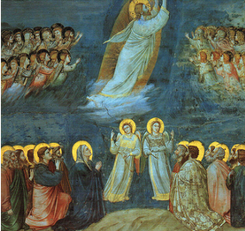

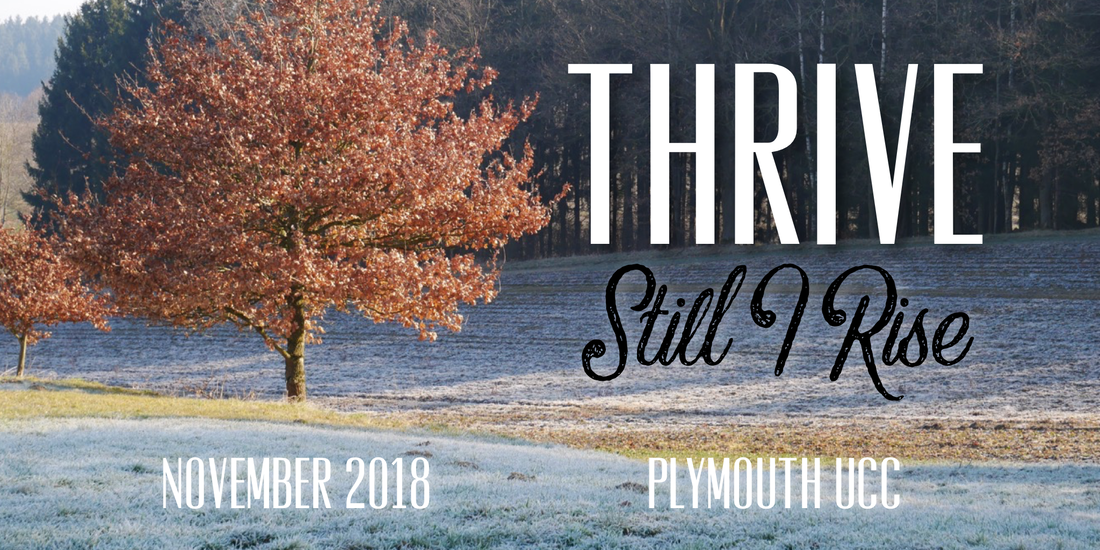
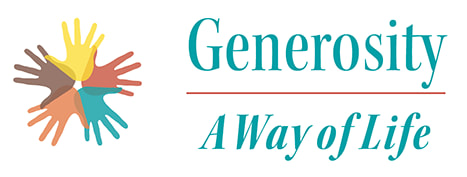
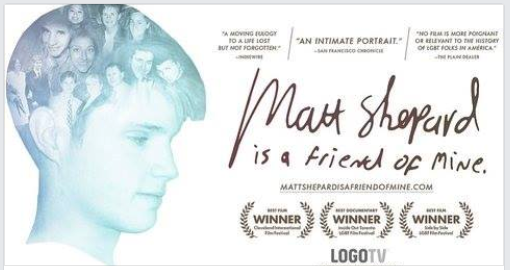
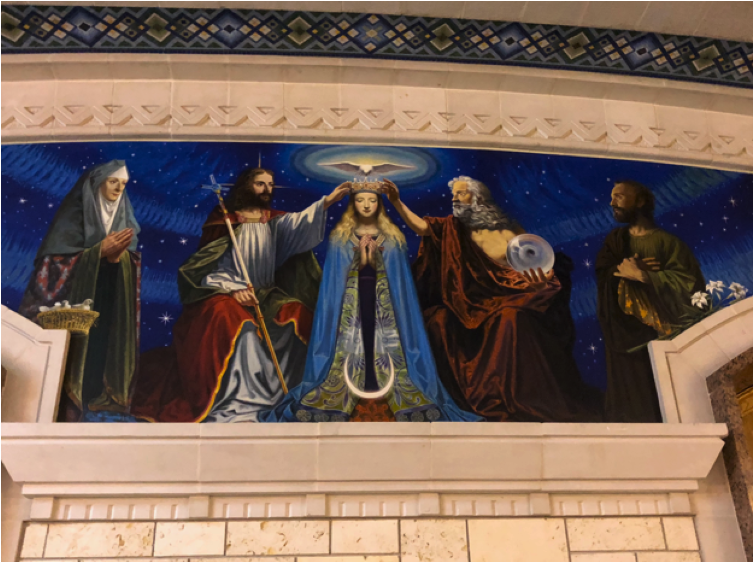
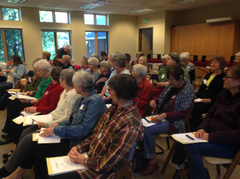
 RSS Feed
RSS Feed